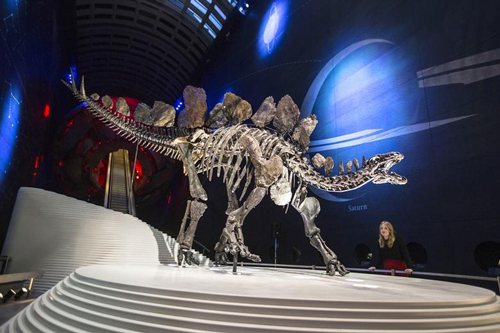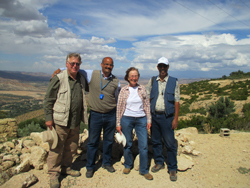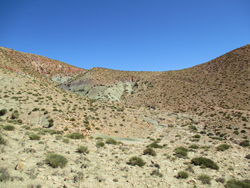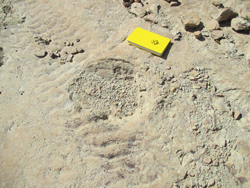Susannah Maidment describes how the first stegosaur discovered in north Africa pushes back the timing of diversification of the armoured dinosaurs
Maidment, S., North Africa’s first stegosaurian dinosaur.
Geoscientist 29 (5), 14-17, 2019
https://doi.org/10.1144/geosci2019-028;
Download the pdf here
Sometime in the summer of 2016, then working at the University of Brighton, I opened my inbox to an email from a colleague who is a sauropod dinosaur expert and works in the US. He had been sent some photos of dinosaur bones from the Middle Atlas Mountains of Morocco that were being sold by a commercial fossil dealer. The bones were described as sauropod dinosaur, but my colleague had his doubts, and he was right. As soon as I opened the photos, it was clear that they were from a stegosaur.
Stegosaurs are one of the most iconic dinosaurs. With two rows of bony plates extending along the back, and two pairs of fearsome spikes at the end of the tail,
Stegosaurus is well-known to seven-year olds everywhere. Despite their popular appeal, however, stegosaurs are very rare as fossils. It was only with the Natural History Museum of London’s acquisition, in 2013, of the world’s most complete
Stegosaurus (known as Sophie) that we learned really basic aspects of their anatomy, like how many vertebrae there were in the spinal column and how many plates there were along the back.
 Left, Sophie, the world’s most complete Stegosaurus, on display at the Natural History Museum (copyright of the Natural History Museum, London)
Left, Sophie, the world’s most complete Stegosaurus, on display at the Natural History Museum (copyright of the Natural History Museum, London)
New species
Stegosaur fossils are known from North America, Europe, China and southern Africa, but none were previously known from north Africa. Consequently, I was extremely excited to see these bones from Morocco, and immediately suspected that they probably represented an entirely new genus and species of stegosaur—one that nobody had ever seen before.
Later that day, Professor Paul Barrett, dinosaur researcher at the Natural History Museum (NHM), contacted me with the same images. He had been sent them too, was equally as excited, and was determined to purchase the specimens for the museum. He was successful and the bones arrived at the NHM in Autumn 2016. As Paul and I began to study them, it became clear that we were right. Although the specimen comprised just a few vertebrae, an upper arm bone and a spike, we could clearly see features unknown in any other stegosaur: we had a new genus and species on our hands.
Fossil excavation for the commercial market in Morocco is quite common and is often carried out by farmers who have no formal scientific training. As a result, important contextual information about how and where the specimen was found is usually lacking. The only information we had about our new stegosaur was that it was from the Jurassic of Boulemane—a town in the Middle Atlas Mountains.
We looked into the literature to try to narrow down the discovery location, and therefore age, of the animal. Jurassic rocks in the area around Boulemane are predominantly marine, but the Bathonian strata are terrestrial, and dinosaur fossils have been reported in them since the 1940s. If the specimen was Bathonian, this made it even more special: it would represent not only the first stegosaur from north Africa, but the oldest definitive stegosaur from anywhere in the world. The only way to be sure where the specimen came from, however, was to go to Morocco and try to track down the original discovery location.
Moroccan excursion
In September 2018, funded by the Geological Society’s Garwood Fund, I travelled to Morocco to attempt to do just that. I was accompanied on the trip by David and Allison Ward, Scientific Associates at the NHM who have been collecting fossils in Morocco for over 20 years and have a network of useful contacts whom we could draw upon to help us out. Most important of these contacts is Moha Segaoui, a fossil dealer who also runs guided geological tours, and has been guiding fieldtrips for UK palaeobiologists and geologists for many years. Moha acted as our guide and translator for the trip, and also proved a very reliable source of wisdom and advice.
Our first aim was to meet with Professor Driss Ouarhache, a sedimentologist and stratigrapher at the Université Sidi Mohamed Ben Abdellah in Fes. Driss is an authority on the sediments of the Boulemane area and he guided us through the stratigraphy. The El Mers Group is divided into three formations: The El Mers 1, 2 and 3. The El Mers 1 comprises shallow marine and intertidal facies overlain by terrestrial red beds, while the El Mers 2 and 3 represent shallow marine deposits. Driss showed us a rippled sandstone bedding plane in the El Mers 1 covered in sauropod footprints.
 Right, From left to right: David Ward, Moha Segaoui, Allison Ward and Driss Ouarhache.
Right, From left to right: David Ward, Moha Segaoui, Allison Ward and Driss Ouarhache.
Having explored the stratigraphy and depositional environments of the El Mers Group, we headed south to Er Rich, to meet the fossil dealers who sold the fossils to the NHM—people the Wards know well. The dealers were extremely helpful and offered to take us to the village where the specimen excavators lived. The next morning we followed the fossil dealers north from our hotel in Midelt to a small village just outside of Boulemane, which we reached by a dirt road. The dealers introduced us to a farmer, who offered us tea and then accompanied us to another farm some distance from the village where the farmer who had excavated the fossils lived. The land next to the house was badlands cut into red beds, extremely similar to those of the El Mers 1 Formation that Driss had shown us on the other side of Boulemane. As the farmer guided us up and down the valleys, I noted abundant bone washing out. There were also numerous large pits from where bones had been excavated. The farmer explained that he collected most of the fragmentary material from drainages, where it washed out, and also excavated larger bones. We returned to the village to a lunch of turmeric goat and very sweet tea.
 Left, The El Mers 1 Formation at the discovery site
Left, The El Mers 1 Formation at the discovery site
The following day I returned to the badlands and was able to study the stratigraphy and depositional environments in more detail, again receiving excellent hospitality in the form of grilled chicken and tea for lunch. The sediments exposed are all terrestrial, and appear to have been deposited by rivers and on floodplains, consistent with our interpretation that these represent the El Mers 1 Formation. The lower part of the section comprises green silts interbedded with thin calcareous sandstones, which I interpret as overbank deposits, while the upper part consists of red mudstones with rootlets and thicker channel sandstones, which represent floodplain palaeosols and river channels. Dinosaur fossils are found in a distinct unit at the top of the green silts. This unit is mottled orange, and contains abundant charcoal and jarosite (a sulfate mineral), and the matrix of the NHM stegosaur specimens matches this unit. The El Mers 1 Formation has been reliably dated to the Bathonian based on biostratigraphy, and we collected some sediment samples in an attempt to confirm that.
Oldest on record
The trip was a huge success. I was able to relocate the discovery site of north Africa’s first stegosaur and confirm that it is also the oldest definitive stegosaur in the fossil record. We have now analysed its evolutionary relationships, and we find that the species is more closely related to European stegosaurs than to the two stegosaur genera currently known from southern Africa. The age of the species also pushes back the radiation of the armoured dinosaurs into the Early Jurassic, hinting at a huge diversity of these animals that we have yet to sample.
 Right, A sauropod hind foot (pes) print on a rippled sandstone bedding plane in the El Mers 1 Formation
Right, A sauropod hind foot (pes) print on a rippled sandstone bedding plane in the El Mers 1 Formation
Furthermore, we are now finalizing a Memorandum of Understanding between the Natural History Museum and Université Sidi Mohamed Ben Abdellah, so that Driss and I can work together in the future to excavate dinosaurs from the site, working with the farmers. We hope that in the long term we will be able to house the specimens that we find in Morocco and prevent the commercial sale of further material, preserving the scientific heritage of the area and inspiring future generations of Moroccan children and adults alike.
Affiliation
Susannah Maidment is a Researcher in the Department of Earth Sciences at the Natural History Museum, London and was a 2018 recipient of the Geological Society of London’s Edmund Johnson Garwood Fund.